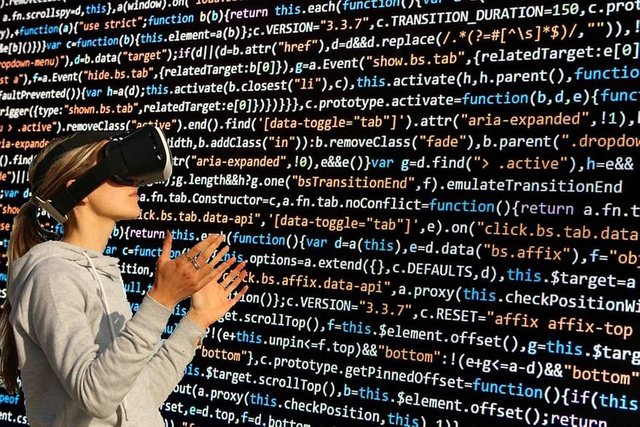 Image credit: pixabay
Image credit: pixabay
We are in the future, VR, Tesla, and Nest is all the proof I need:
Netflix has been making waves by touching on various ethical issues involving technology, but real life is not so different from Black Mirror. Devices have been shrinking ever since Moores Law was introduced in 1965, (which statesthat the number of transistors per square inch on integrated circuits had doubled every year since their invention.) This has made every major electronic device shrink consistently over the last 50 years and is one of the reason our phones are advancing so quickly. This created what is now known as the internet of things, which is an ecosystem of electronic devices that work together. Sometimes this can be called a “handset eco-system.” This means that all the devices despite working together, could be different makes or models, but are generally produced by the same company. For example, Apple has their branded ecosystem to include: Apple Watch, Macbooks, iPhones, iPods, and iPads. Across these devices which allows you to get your iMessages through all your apple products. Some other companies even use the same kind of technology and sync up with your phone, such as Nest, which is a thermostat system you can control with your laptop, phone or internet connected smart devices. Nest started with just thermostat controls- now you can control your locks, your lights, your temperature, and literally turn your home into an internet of things. Nest will track your habits, and this data is encrypted, so it is secured against most people getting into it, however there are always going to be bad actors trying to get into peoples data. With the data tracking it is a double edged sword, however it is good and bad. Nest actually learns from your habits over time and sets the temperature perfectly after a little while of using it. It gets better over time and even works with products such as Amazons' Alexa. Alexa can refill your razors or soap, change your music, and even lock your doors if you have the right locks.
Just because you can, doesn't mean you should
Generally speaking these are wonderful things that save energy, but there are negative sides of having your building being interconnected. Ethics and technology do not often move at the same pace, and very often ethics trails behind technology, “Your scientists were so preoccupied with whether or not they could, they didn’t stop to think if they should.” -Ian, from Jurassic Park. With that being said, people who are capable will try to hack systems just like that just for fun. Some of these vulnerabilities can and will be exploited and for some aspects this can be very harmless, like a prank on a friend. This can also be malicious and could be some stranger getting into your tech. With your watch, you can view your messages, adjust your thermostat, lock your doors, and start your car. Cars are now self driving, and can pick you up thanks to Tesla, and google forerunning the smart car killer apps. The future is here as many people would define it, and people will either adapt, or be left behind. The security vulnerability with the internet of things can be very serious, but it is not impossible to secure. If you ever played Deus Ex, or Fallout- hacking things can seem so rudimentary that it kind of desentisizes us to that word and the ethical implications- but be aware that hacking into someones home without their consent is a felony. According to 18 U.S.C. § 1029, you cannot legally get into someones applications or anything that stores their personal data legally without their permission. (More information on cyber crimes here) heres a small list of data that could be compromised due to the integration we have in our technology:
- Credit card information
- Fitness and vitals data
- Location data
- Shopping history
- Browsing history (even if you go incognito)
- Networking information (who you talk to, what you say to them)
- Potentially Not safe for work photos
- Social security number
- Other insights into your life like political affilation, or sexual preference.
Not everyone is going to get hacked, but the number of cyber crimes have increased ever since the introduction of the internet to more and more homes. According to the Bureau of Justice- Approximately 68% of the victims of cyber theft sustained monetary loss of $10,000 or more. By comparison, 34% of the businesses detecting cyber attacks and 31% of businesses detecting other computer security incidents lost more than $10,000. These are business that for the most part have dedicated cyber security employees that are supposed to protect said data. This makes it hard for the average person, but securing your data and Personally Identifyable Information (PII) is on your shoulders. Here is a comprehensive guide on data security.
Ultimately we are responsible for our own data
We are more connected than ever. Our data and information is spread accross so many different mediums and devices. It is on us to use the proper safeguards to keep our data and identity. With technology moving faster than some of us can keep up, it can be a scary time for a lot of people, however, I personally chose to embrace and welcome these changes into my life by adapting to it. I love technology, and would be so excited to see where this technology will take our lifestyles. I am also curious to see how the cyber security realm will change to adapt to these issues and technology.
Follow me @money-talks
Source: https://www.theodysseyonline.com/technology-moving-faster-than-anyone-imagined
!cheetah ban
Downvoting a post can decrease pending rewards and make it less visible. Common reasons:
Submit
Okay, I have banned @money-talks.
Downvoting a post can decrease pending rewards and make it less visible. Common reasons:
Submit